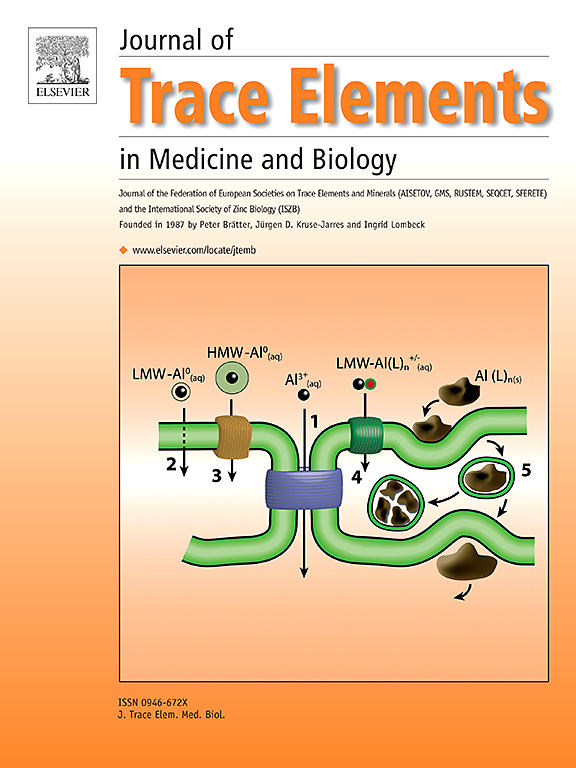六价铬暴露对人肺成纤维细胞代谢组的影响。
IF 3.6
3区 医学
Q2 BIOCHEMISTRY & MOLECULAR BIOLOGY
Journal of Trace Elements in Medicine and Biology
Pub Date : 2025-09-12
DOI:10.1016/j.jtemb.2025.127750
引用次数: 0
摘要
导言:肺癌是癌症死亡的头号原因,几十年来生存率没有显著提高。肺癌的潜在机制尚不清楚,但已知染色体不稳定、DNA改变和细胞能量失调是癌症的关键。然而,在化学致癌过程中能量学的重要性尚未被探索。方法:我们将人类肺细胞暴露于六价铬[Cr(VI)](一种已知的人类呼吸道致癌物)中24或120 h。然后,我们进行非靶向代谢组学,通过差异代谢组学分析浓度和时间的变化。结果:随着Cr(VI)浓度的增加,代谢反应明显,随时间的变化,代谢反应存在差异,其中氨基酸代谢和核苷酸代谢的代谢富集受时间和Cr(VI)处理的影响。结论:本研究首次提供了能量代谢反应与化学致癌之间的联系,为更深入地研究Cr(VI)如何改变细胞代谢反应诱导肺癌提供了基础。我们预计我们的研究将成为更深入研究细胞能量失调在癌变过程中的作用的起点,这将进一步确定这些变化是癌变的关键早期事件。本文章由计算机程序翻译,如有差异,请以英文原文为准。
Hexavalent chromium exposure impacts the metabolome of human lung fibroblast cells
Introduction
Lung cancer is the number one cause of cancer death and survival rates have not significantly improved for decades. The underlying mechanism of lung cancer remains elusive, but it is known chromosome instability, altered DNA, and dysregulated cellular energetics are key to cancers. However, the importance of energetics during chemical carcinogenesis is unexplored.
Methods
We exposed human lung cells to hexavalent chromium [Cr(VI)], a known human respiratory carcinogen, for 24 or 120 h. Then, we performed untargeted metabolomics and analyzed changes with concentration and time through differential metabolomics.
Results
There was a distinct metabolic response with increasing Cr(VI) concentrations and a difference in the metabolic response with time, where metabolic enrichment of amino acid metabolism and nucleotide metabolism were affected with time and Cr(VI) treatment.
Conclusions
This study provides the first link between energy metabolism responses and chemical carcinogenesis, providing the foundation for a more in-depth investigation into how Cr(VI) alters the metabolic response of cells to induce lung cancer. We anticipate our study will be a starting point for more in-depth investigations into the role of dysregulated cellular energetics during carcinogenesis, which will further establish these changes as a critical early-stage event in carcinogenesis.
求助全文
通过发布文献求助,成功后即可免费获取论文全文。
去求助
来源期刊
CiteScore
6.60
自引率
2.90%
发文量
202
审稿时长
85 days
期刊介绍:
The journal provides the reader with a thorough description of theoretical and applied aspects of trace elements in medicine and biology and is devoted to the advancement of scientific knowledge about trace elements and trace element species. Trace elements play essential roles in the maintenance of physiological processes. During the last decades there has been a great deal of scientific investigation about the function and binding of trace elements. The Journal of Trace Elements in Medicine and Biology focuses on the description and dissemination of scientific results concerning the role of trace elements with respect to their mode of action in health and disease and nutritional importance. Progress in the knowledge of the biological role of trace elements depends, however, on advances in trace elements chemistry. Thus the Journal of Trace Elements in Medicine and Biology will include only those papers that base their results on proven analytical methods.
Also, we only publish those articles in which the quality assurance regarding the execution of experiments and achievement of results is guaranteed.

 求助内容:
求助内容: 应助结果提醒方式:
应助结果提醒方式:


